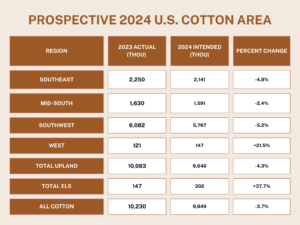Welcome to the February 19, 2024 issue of Cotton News, a service provided by Plains Cotton Growers Inc. for the cotton industry in the Texas High Plains and beyond.
Highlights from the National Cotton Council Annual Meeting
From February 16 to February 18, the Plains Cotton Growers Inc. delegation voted to approve important regulations impacting the national cotton industry and participated in discussions to continue to improve and enhance the industry at the National Cotton Council Annual Meeting in Orlando, Florida.
While there, PCG producers attended committee meetings with all cotton industry segments as well as the American Cotton Producers meeting and Texas Cotton Producers meeting. Here are the highlights in order of the NCC agenda.
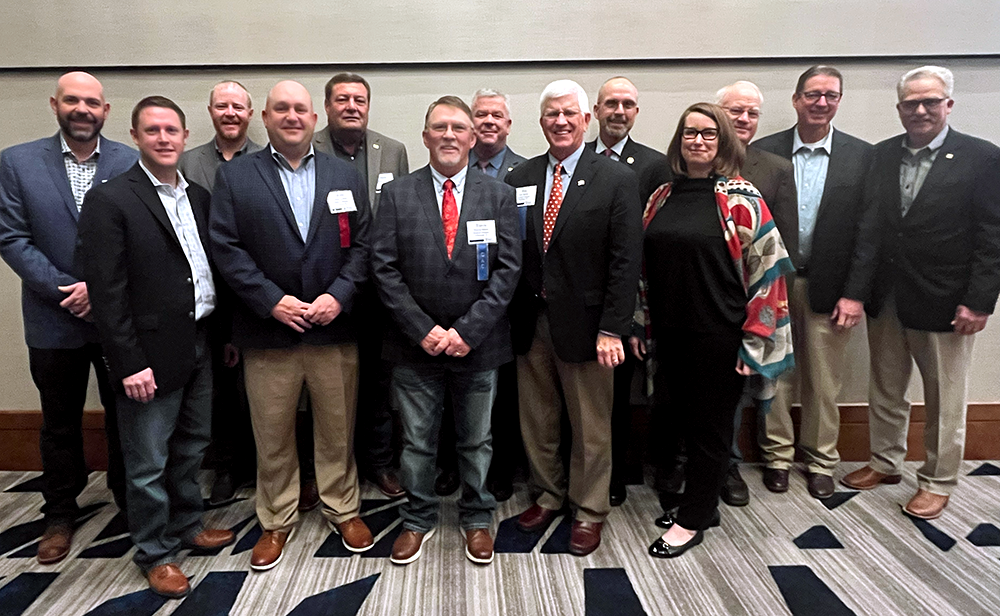
PCG Delegates/Committee Appointments
Farm Program & Policy Committee:
Brent Coker – Lamb County (Alternate: Thomas Kennedy, Lubbock County)
Bryan Patterson – Lubbock County (Alternate: Seth Sowder, Lamb County)
International Trade Policy Committee:
Rex Kennedy, Lubbock County (Alternate: Rhett Mimms, Lubbock County)
Travis Mires, Lynn County (Alternate: Cody Ellison, Gaines County)
Quentin Shieldknight, Hansford County (Alternate: Greg Slough, Hansford County)
Nick Nelson, Castro County (Alternate: Katy Holladay, Dawson County)
Public Relations & International Market Development Committee:
Scott Harmon, Lubbock County (Alternate: Greg Glover, Potter County)
Research & Education Committee:
David Carter, Hockley County (Alternate: Barry Evans, Swisher County)
Packaging and Distribution Committee:
Jon Jones, Floyd County (Alternate: Steve Olson, Hale County)
Brent Nelson, Lamb County (Alternate: Glen Phipps, Dawson County)
Health Safety & Environmental Quality Committee:
Jeremy Brown, Dawson County (Alternate: Justin Cave, Midland County)
Mark Howard, Dallam County (Alternate: Dee Vaughan, Moore County)
Johnie Reed, Swisher County (Alternate: Steve Verett, Crosby County)
American Cotton Producers Delegates:
Martin Stoerner, Floyd County
Stacy Smith, Lynn County
Cotton Council International Delegates:
Barry Evans, Swisher County
Brent Nelson, Lamb County
Cotton Council International Board of Directors Meeting
This year, PCCA Export Sales Manager Carlos Garcia fulfilled his term as CCI Chair.
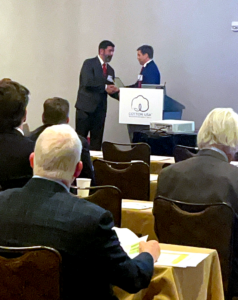
PCCA Export Sales Manager Carlos Garcia accepting his plague of service from CCI for serving as their Chair and President.
“We greatly appreciate Carlos’ outstanding leadership and contributions to the U.S. cotton industry while serving as both president and chairman of CCI for both 2022 and 2023,” said Steve Dyer, incoming CCI Chair and cotton merchant from Tennessee. “Mr. Garcia served with vitality, dedication, vision and endurance in the Cotton USA program around the world.”
In 2023, CCI hosted 30 Cotton USA events in 20 countries, according to CCI Executive Director Bruce Atherley. In his report, Atherley expressed concerns about Brazil’s competitive advantages over the U.S. as they’ve increased their promotional efforts copying some of CCI’s structure.
“The two things we have that Brazil does not is our supply chain transparency and trust protocol program,” he added. “It’s these two things that will separate us from Brazil if we continue to enroll producers and brands/retailers into the protocol program.”
The deadline to upload 2023 bales into the U.S. Cotton Trust Protocol program is March 1, 2024.
The deadline to enroll your 2024 crop into the protocol program is midnight on March 30, 2024.
American Cotton Producers Business Session
It was a packed agenda with a packed house at the American Cotton Producers Meeting in Orlando.
Political Perspectives on the 2024 Farm Bill
The program began with Anne MacMillan, a political strategist and contracted lobbyist for National Cotton Council.
Key takeaways from her report:
- House is likely to flip back to blue.
- Senate is likely to flip red with 23 democrat seats up for grabs compared to just 11 republican seats. Republicans only need to net two seats to take the majority. “So the standoffs we’re seeing politically probably won’t change, they’ll just be rearranged.”
- The Farm Bill is stuck. “I mean that with no disrespect to any of the Congressional staff members that are present, but it doesn’t seem that efforts are moving forward in regard to the Farm Bill.”
- She also echoed everyone else’s sentiments that have discussed the Farm Bill this year (or politics in general): “In the 25 years, I’ve been doing this — I started with the 2002 Farm Bill — this is the strangest it’s been on Capitol Hill regarding farm policy. My job is to fix problems in Washington, and I can’t fix this one.”
- However, she remains hopeful. “I’ve known all these people forever, and I know the desire for action is there. I believe they will figure it out.”
2024 Farm Bill Priorities from ACP/PCG
- ARC/PLC
- Increase the statutory seed cotton reference price in this program to better reflect current costs of production.
- Crop Insurance
- Expand the availability of the Stacked Income Protection Plan (STAX) by removing the prohibition of PLC enrollment and the purchase of STAX coverage.
- Urge the accelerated development of federally assisted insurance or other risk management programs such as but not limited to grants, cost-share programs, low interest loans or other related program for cotton ginning, warehousing, merchandising, textile manufacturing and crushing operations to mitigate the risk of losses associated with reduced processing volume attributable to a significant decline in crop production.
- Cotton Loan Program
- Enhance the Upland cotton marketing loan program by raising the level of the loan rate and modernizing the loan repayment provisions.
- Improve the safety net for Pima cotton producers by increasing the level of the loan rate and establishing marketing loan repayment provisions similar to Upland cotton.
Texas Cotton Producers Business Session
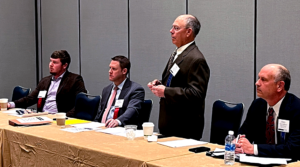
Texas Cotton Producers Chair Chris Hirt conducts the meeting while PCG CEO Kody Bessent takes the minutes.
There were uplifting reports around the room bright and early Saturday morning at the Texas Cotton Producers business session.
“This will be the best planting start we’ve had in four years,” said Jon Gwynn, South Texas producer.
“This will be the best planting start we’ve had in longer than that,” Matt Huie, South Texas producer added to Gwynn’s comment.
While producers were talking about receiving some moisture and stabilized intended planting acres, NCC field representative Rick King commented, “It’s been a while since we’ve heard this!”
Infrastructure Assistance Efforts Continue
The quest for infrastructure assistance started as early as December 2022, when PCG instigated an effort to include disaster assistance for cotton infrastructure the federal 2022 omnibus spending package. Unfortunately, while a valiant effort was made, the initial federal attempt succumbed to political adversity and was left out of the final legislation.
As the Texas 88th Legislative Session convened, PCG and others spent the duration of the session working to develop a one-time block grant that cotton infrastructure could qualify for to help keep them in business following one of the most catastrophic years in cotton production history. PCG lead the effort with the support of more than 170 agricultural organizations and cotton infrastructure segments advocating for the Texas legislature to pass much needed assistance.
While the Texas legislature was unable to muster the political means to include the request in the end, PCG has not given up, and we continue to look for legislative vehicles both at the federal and state level to develop disaster assistance in the near-term for cotton infrastructure. As part of a long-term solution for infrastructure, PCG, along with other Texas groups, have been looking into a research study on harvest incentives.
During the TCP session, South Texas Cotton and Grain Association Executive Director Jeff Nunley, presented the idea of funding this study — conducted by the Texas A&M University Agricultural Food and Policy Center — to explore options for harvest incentives for producers. South Texas producer Jon Whatley made the motion seconded by Rolling Plains producer Richard Goana.
NCC General Session
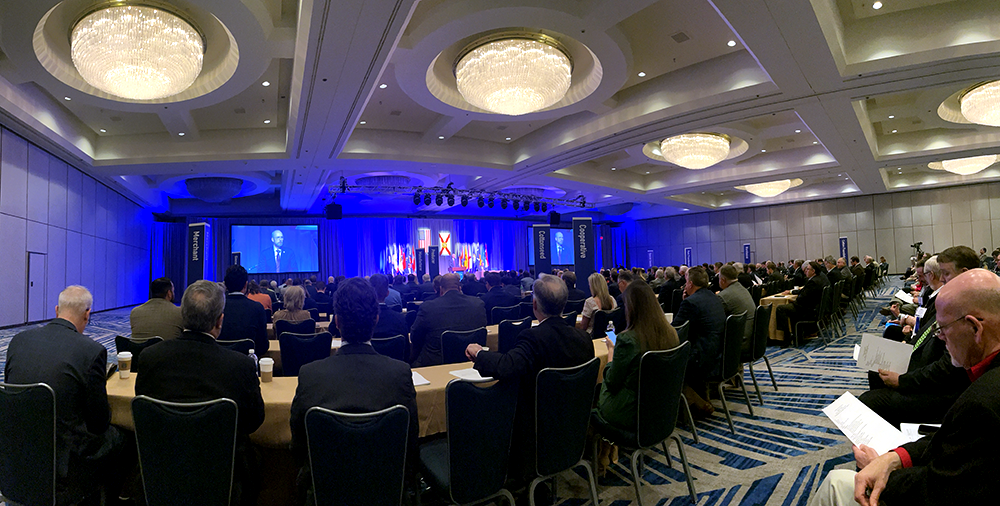
NCC Chair and Dawson County Producer Shawn Holladay conducted the closing session of the National Cotton Council annual meeting. In the session, it was announced that the Committee for the Advancement of Cotton (PAC) raised more than $130,000 during the three-day meeting for it’s political advocacy efforts.
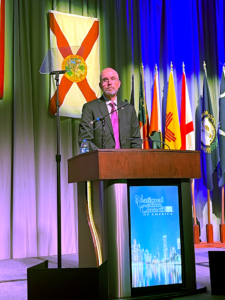
NCC Chair Shawn Holladay, Dawson County producer presides over the NCC General Session February 18.
Planting Intentions Survey
NCC Vice President of Economics and Policy Analysis Jody Campiche reported a U.S. planting estimate of 9.8 million acres for all cotton (ELS and Upland), down 3.7% compared to 2023. The survey was conducted in December and is a reflection of the time period when the surveys were completed throughout the U.S.
“Planted acreage is just one of the factors that will determine supplies of cotton and cottonseed,” Campiche added. “Ultimately, weather and agronomic conditions are among the factors that play a significant role in determining crop size.”
Planting intentions by region for Upland cotton are as follows:
- Southeast (Alabama, Florida, Georgia, North Carolina, South Carolina and Virginia) intend to plant just over 2 million acres, which is down 4.8% from last year.
- Mid-South (Arkansas, Louisiana, Mississippi, Missouri and Tennessee) intend to plant just shy of 1.6 million acres, which is down 2.4% from last year.
- Southwest (Kansas, Oklahoma and Texas) intend to plant roughly 5.7 million acres, which is 5.2% less than last year.
- West (Arizona, California and New Mexico) is estimated at 147,000 acres, which is up from last year by 21.5%.
The 2024 estimated ELS acreage increased by more than 37% compared to last year at 202,000 acres.
Harry S. Baker Distinguished Service Award
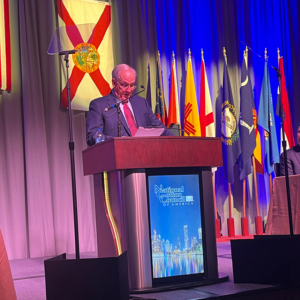
PCCA Executive Director Kevin Brinkley accepts the Harry S. Baker Distinguished Service award on behalf of former PCCA Chairman Eddie Smith.
Former PCCA Chairman Eddie Smith was honored with the Harry S. Baker Distinguished Service Award February 18. PCCA Executive Director Kevin Brinkley accepted the award on his behalf.
“In life and industry challenges will come and go, but we must never stop pushing forward,” Brinkley said, reading from remarks Smith gave him.
Brinkley went on to say he was grateful to the industry for bestowing this well-deserved honor on Smith. “Whether you know Eddie or not,” Brinkley added, “your life has been positively impacted by him and his quiet leadership of this industry for several decades.”
Oscar Johnston Lifetime Achievement Award
Former Plains Cotton Growers CEO and Crosby County Producer Steve Verett received the Oscar Johnston Lifetime Achievement Award this year from the National Cotton Council.

Former PCG CEO Steve Verett, Crosby County producer, accepts the Oscar Johnston Lifetime Achievement Award.
“I want to thank the NCC staff and leadership for this award, as well as Patricia and my family,” Verett said when accepting the award. “I also want to thank my PCG family. It’s through their support that I was able to do anything.
“I came to my first NCC annual meeting in 1982 at 29 years old. I was mesmerized by all segments of the cotton industry coming together. It wasn’t always easy, but they were able to work out policy that could represent and benefit the whole industry. It was the envy of the commodity world — how the cotton industry could come together. When I came on as PCG CEO, my mission became fostering and enhancing volunteer leadership. Staff is critical, but the heart and soul and driving factor should always be the volunteer leadership. And the cotton council has always exhibited that.”
Upcoming Events
Auxin Training – Hale County
Date: February 22, 2024
Location: Hale County Extension Office – Plainview
Managing Nutrition in Dry Regions Workshop
Date: February 22, 2024
Location: FiberMax Center for Discovery
Olton Crops Conference
Date: February 28, 2024
Location: Olton Ag Pavilion, Olton, TX
Auxin Herbicide Required Training – Levelland
Date: February 29, 2024
Location: Levelland, TX
For a full list of upcoming events, see the Events Page.
